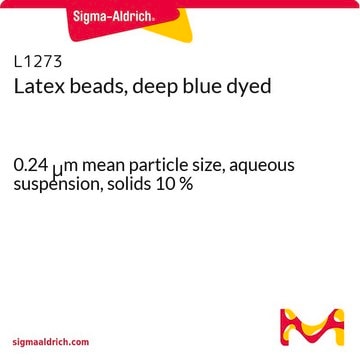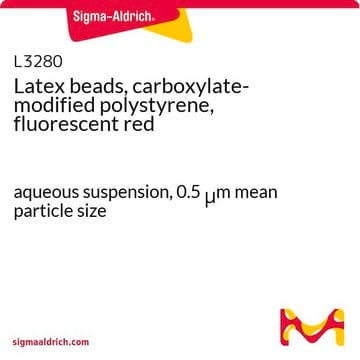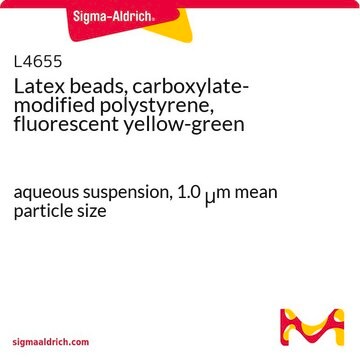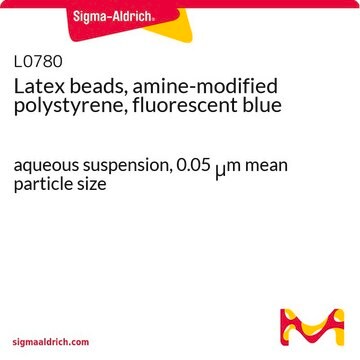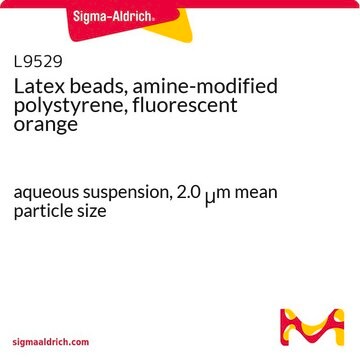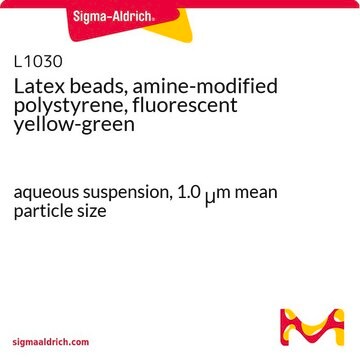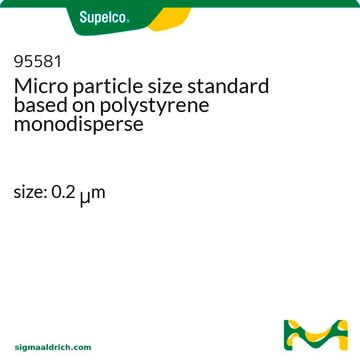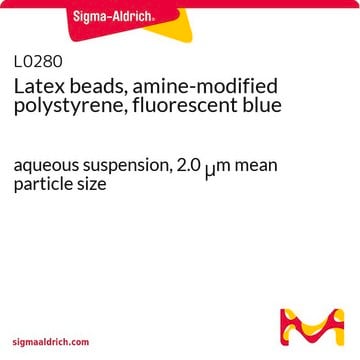L1148
Latex beads, deep blue dyed
0.055 μm mean particle size, aqueous suspension, solids 10 %
Bejelentkezésa Szervezeti és Szerződéses árazás megtekintéséhez
Összes fotó(1)
About This Item
Javasolt termékek
Looking for similar products? Látogasson el ide Útmutató a termékösszehasonlításhoz
Alkalmazás
Latex beads have been used to study the regulation of primary mesenchyme cell migration in the sea urchin embryo and to gain a better understanding of the role of ecto-NAD+ glycohydrolase, an enzyme predominantly associated with phagocytic cells. Latex beads have also been used to develop a new technique for measuring the plaque-forming cell (PFC) responses to bacterial antigens.
Tulajdonságok és előnyök
Dye incorporated into beads, not surface-linked
Tárolási osztály kódja
12 - Non Combustible Liquids
WGK
WGK 3
Lobbanási pont (F)
Not applicable
Lobbanási pont (C)
Not applicable
Válasszon a legfrissebb verziók közül:
Már rendelkezik ezzel a termékkel?
Az Ön által nemrégiben megvásárolt termékekre vonatkozó dokumentumokat a Dokumentumtárban találja.
Az ügyfelek ezeket is megtekintették
Gary G Martin et al.
The Biological bulletin, 211(3), 275-285 (2006-12-21)
Peritrophic membranes (PTMs) are secreted acellular layers that separate ingested materials from the gut epithelium in a variety of invertebrates. In insects and crustaceans, PTMs are produced in the midgut trunk (MGT, or intestine), but the MGT in decapod crustaceans
C D Muller et al.
Biology of the cell, 68(1), 57-64 (1990-01-01)
In order to gain a better understanding of the role of ecto-NAD+ glycohydrolase, an enzyme predominantly associated with phagocytic cells, we have studied its fate in murine macrophages (splenic, resident peritoneal and Kupffer cells) during phagocytosis of opsonized on mannosylated
C A Ettensohn et al.
Developmental biology, 117(2), 380-391 (1986-10-01)
After their ingression, the primary mesenchyme cells (PMCs) of the sea urchin embryo migrate within the blastocoel, where they eventually become arranged in a characteristic ring-like pattern. To gain information about how the movements of the PMCs are regulated, a
O Bagasra et al.
Journal of immunological methods, 49(3), 283-292 (1982-03-26)
A new latex bead technique for measuring the plaque-forming cell (PFC) responses to bacterial antigens is described. This technique has been designed for the study of antigens that cannot be readily coated onto SRBC but may also used for antigens
Delfine Cheng et al.
Micron (Oxford, England : 1993), 132, 102851-102851 (2020-02-25)
Kupffer cells are liver-resident macrophages that play an important role in mediating immune-related functions in mammals and humans. They are well-known for their capacity to phagocytose large amounts of waste complexes, cell debris, microbial particles and even malignant cells. Location
Tudóscsoportunk valamennyi kutatási területen rendelkezik tapasztalattal, beleértve az élettudományt, az anyagtudományt, a kémiai szintézist, a kromatográfiát, az analitikát és még sok más területet.
Lépjen kapcsolatba a szaktanácsadással